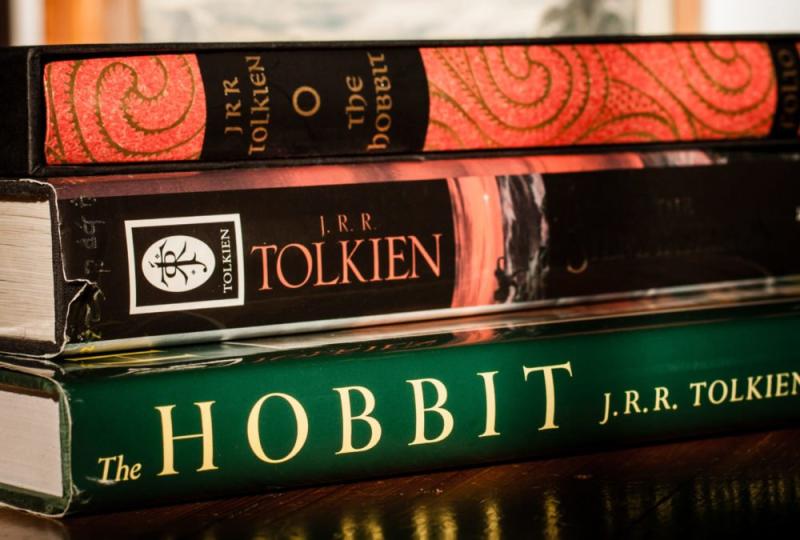Leftist Ghouls May Desecrate J.R.R. Tolkien, But His Ideas Will Never Die
By: Nathanael Blake (The Federalist)



Tolkien's books are timeless because they present a vision of goodness and beauty, far better than what is offered today by those appropriating his greatness to serve the latest intellectual fashions. By Nathanael Blake By Nathanael BlakeJune 23, 2021
J. R. R. Tolkien never got far in writing a sequel to "The Lord of the Rings." He found it "depressing" work and despite a few attempts, the project, tentatively titled "The New Shadow," never made it past the first chapter. The story would have been something of a thriller, with the peace established after the defeat of Sauron threatened by plots and cults arising from the "inevitable boredom of Men with the good."
This insight certainly applies to the current leadership of the Tolkien Society (of which Tolkien himself was once president), which has decided to desecrate his work. The group's latest academic seminar includes presentations such as "Transgender Realities in The Lord of the Rings , " "The Queer in Tolkien's The Lord of the Rings " and " Destabilizing Cishetero Amatonormativity in the Works of Tolkien." Were these papers honest scholarship, they would be blank pages. Tolkien was a faithful Catholic whose work reflected his beliefs.
But as Tolkien knew, men are easily bored and dissatisfied, even with the good. So these scholars are narcissistically appropriating Tolkien's greatness to serve the latest intellectual fashions, rather than appreciating it and engaging with it honestly. Whether just to impress tenure committees or out of true radicalism, these scholars approach Tolkien's work as Sauron did Middle-Earth — with a lust for domination.
Projecting modern ideological obsessions onto Tolkien's creation attempts to intellectually subdue someone else's work. Of course, reading a text always includes interpretation, but interpretation is engagement, not control. Interpretation presumes Tolkien is speaking, or writing, to us. We may actively respond to what he wrote, and even bring our current concerns into our reading, but the author and his creation must be respected as partners in dialogue.
We must be willing to be led by the text — and to accept a "no" from it. The text will not always tell us what we want to hear, and the author might have been horrified at the thought of what we want. To read what we want into the text anyway is to dictate to the work and its author, rather than conversing with them.
Efforts to use Tolkien's masterpiece to advance today's ideological fashions arise from our culture's overwhelming narcissism — assuming tales of Middle-Earth have to be about us and the preoccupations of the moment. For all of their talk of diversity and multiculturalism, people reading through this narcissistic lens cannot bear much variety, or stories about anything but them and their concerns.
This is why so much film, television, and fictional writing is drearily similar, despite a multitude of settings. Whether sci-fi, fantasy, or historical drama, the characters always seem to think and speak in recognizably modern terms. Writers invent worlds and then fill them with stock characters and stories from our own time.
Predictably, this produces bad art and entertainment that is quickly obsolete. Today's works will soon be out of fashion and perhaps denounced as problematic in their turn. As a result, there's an incentive to appropriate great works of the past and absorb them into the latest trends.
Some trying to find transgenderism in Tolkien may feel they are doing him a favor; instead of denouncing him, they are finding ways to integrate him (albeit not without problematizing and critiquing him) into today's vogue opinions. It's a bit like what Augustine did for Platonism and Aquinas did for Aristotle, only here it is the Catholic writer being brought into a new, post-Christian system of belief.
But this effort illuminates the folly of trying to make Tolkien's work compatible with today's trends. The endurance of "The Lord of the Rings," along with "The Hobbit" and various materials edited and posthumously published by Christopher Tolkien, is not because of the Tolkien Society and its dubious scholarship. These books and their stories are timeless because they present a vision of goodness and beauty far better than what is offered today.
Critics have scorned Tolkien's tales of magic and monsters as adolescent, but it is our culture that idolized self-indulgent perpetual adolescence. Tolkien's works use armies of monsters commanded by an incarnate Dark Lord to illustrate adult virtues and moral complexity. His moral vision is far more advanced than those who worship their own desires as the highest good.
For readers who heed him, Tolkien instills a longing for that which is noble and beautiful, and instructs us in the need for humility and kindness. He also tells a good story, which keeps readers coming back.
"The Lord of the Rings" provides an antidote to the problem Tolkien identified in his abandoned sequel. Against the human propensity to become bored, even with peace and plenty, Tolkien sets a story that kindles the moral imagination to aspire to that which is great and beautiful. His work will therefore always resist those who seek to pervert it to their own ends.

Nathanael Blake is a postdoctoral fellow at the Ethics and Public Policy Center.




Shall we call him a devotee of J. R. R. Tolkien?
To be filed under a defense of Literature.
I loved the Lord of The Rings trilogy and all the movies.
They are fairy tales though.
Tolkien’s Anarcho-Monarchism - Ordinary Times
The best thing I’ve read all week, by a long shot, has been David Hart’s musings on J.R.R. Tolkien and his rather odd politics, what Hart describes as anarcho-monarchism. Here’s a letter from Tolkien to his son, Christopher explaining his own political leanings:
I rewatched the movies a couple months age for the first time since they came out, and they were way better in high school.
My son sent me the Hobbit trilogy in 4K for my birthday last month, so I bought the Lord of the Rings trilogy in 4K to complete the set. I haven't' watched those movies since it first came out on DVD years ago. I still haven't pulled the plastic off the box set yet.
I have the box dvds. They were from when each film came out though.
I take that back, I only have the Lord Of The Rings ones, not the Hobbit ones.
Every once in a while I will see that they are showing them on tv somewhere.
The title of this article b.s. clickbait!
Moving on, having read both Tolkien and Peake who I consider to be the superior writer and remains a what is termed a writer's writer, may a degree of obscurity continue to keep him sheltered from the ravages of all cultures.
Exactly, it just spouts rhetorical nonsense complaining about the names of academic seminars without a lick of substance.
Yeah it is wrong to read modern cultural norms and values into the works written by a middle-aged professor in his 1937 children's book (the Hobbit) and his subsequent Lord of the Rings masterpiece written in the 1940s and 1950s. Tolkien was a fantasy writer who loved the art of language. It is a stretch to presume his collective works were prescient narratives on modern culture.
This is like reading truth from the Bible. It is very easy to read whatever one wishes into a long work full of words ripe for being taken out of context.
Big problem is that some people just cannot read good a book(s) and enjoy them for their content as they were written. J.R.R. Tolkien is my favorite all time author and it disgusts me to see current day critics try to pick his works apart every which they they can to fit their particular worldviews and agendas for their own benefit.
It’s stupid. We seriously need to start teaching more in history classes about presentism and why it is best to avoid it.
It is kinda like Lovecraft. The dude was super fuckin racist, even a bit on the extreme side for his time, but I still appreciate his horror work for what it is. I am not reading it looking for deeper meaning about anything, I am reading it to be entertained.
Like the writer of my namesake. Kind of a homophobe but I still enjoyed the books when I was young.
Mhm. Apparently he doesn’t think to highly of gay people, but it isn’t like he and o are drinking buddies. I read his books years back and enjoyed them. Now if they had long diatribes about how homosexuals are bad etc. then we would have a problem, but they don’t because that is not what they are about.
I am not going to start letting the views and opinions of authors on social or political issues influence my opinion of their works if that isn’t what their works are about. Especially when the authors wrote decades or centuries ago. Shit has changed a lot since then.
Lol, he was racist on the level that it’d be easier to list who he didn’t think was a mongrel (hint white people of Anglo ancestry). Oh, and of course he wasn’t a fan of Jews, but that shouldn’t come as a surprise.
Even still though, the dude wrote good shit.
I have read some H.P. Lovecraft but find a lot of his work is just too way out there for my tastes.
It isn’t for everyone 👍
Pretty sure he was mega high when he came up with some of it.
They are fantasy books written in the early 20th century to entertain people, don’t make them anymore than what they are.
No, I would say things are similar because they have all been done before.
Pretty hard to be original these days, after thousands of years of humans creating art in its various forms.
Simpson's did it !
Haha
Kinda like music in a way. Only so many beats one can come up with.
Sounds like a load of crap, even though I am not getting the point he is supposedly making. Everyone in their own mind can see something a little different. Telling people they cannot have their own interpretation is asinine. Then adding if they do have their own interpretation it can only be used in dialogue with a deceased author?